- Home
- Allan Topol
Washington Power Play Page 2
Washington Power Play Read online
Page 2
“Those platitudes all sound good,” said Yao, “but how do you propose to do that?”
“I have in mind a two-step process. First, we confront and weaken America’s presence in East Asia. Second, we negotiate with them as equals and reach an agreement on a new world order.”
“And you think they will be willing to do that?”
“At the end of the Second World War, at Yalta, the United States reached that type of agreement with Russia, ceding control over Eastern and Central Europe. Then the US was invincible. Now they are weary as a nation.”
Liu watched as Yao closed his eyes and stroked his chin. Liu thought he looked intrigued by the proposal.
When Yao opened his eyes, he said, “Our chances of success will be much better if we have a top American official working with us.”
Liu was thrilled to hear Yao’s words. “Precisely,” he agreed. “I have already arranged that.”
“How much did you have to pay the American to come over to our side?” Yao asked.
“Nothing. For him it is a matter of principle.”
“I prefer that,” approved Yao. “Those who sell out for money can easily be turned by a higher bidder. How soon will you begin?”
“It would be better to wait a month,” said Liu cautiously. “Let the dust clear from our Jasper operation. Also, I want to find the right opportunity.”
“As you wish, Minister Liu. You have the most at stake. I will not tolerate another failure on your part.”
Yao’s words jolted Liu, but he showed no emotion. Instead, he fired back, “Operation New World Order will succeed.”
PART I
January, One Month Later
Bethesda, Maryland
Kelly Cameron assembled her team in a conference room in Walter Reed Hospital for a final prep session. It was fifteen minutes before ten o’clock on a blustery, rainy evening. The twenty were all, with the exception of Kelly, battle-hardened from the wars in Iraq and Afghanistan.
The twenty members of her team, sixteen men and four women, were in military dress so they wouldn’t stand out in the military hospital—all except Kelly, who was wearing a black wool pantsuit. They were all members of an elite new FBI counterterrorism unit, AT-1.
Kelly was worried their operation would fail. And she had a lot riding on this operation. Even before she had planned it, her position had been precarious. Many in the FBI had criticized Director Forester for naming Kelly—a woman, and only thirty-five—as the chief of AT-1. Senator Dorsey’s subcommittee on terrorism in the United States, she learned later, had put the FBI director through a grueling interrogation in a closed-door session over the appointment. Other top FBI officials had criticized it in the press while withholding their names. Several articles appeared in the Washington Post beginning with the words: “Unnamed sources in the FBI have stated that . . .” But Forester hung tough.
Now it was showtime. Racing through Kelly’s mind were the things that could go wrong. Ten days ago, a CIA mole planted in Iraq had forwarded information to his handler in Baghdad: ISIS is planning an attack on Walter Reed at 2 a.m. in ten days. That was a little over four hours from now. The informant didn’t know how many terrorists would be taking part, or whether they would be hitting the hospital by air or land. What he did report was that the terrorists wanted maximum publicity with the attack. They intended to show that the United States couldn’t even protect its own wounded military personnel. The CIA was convinced the intel was reliable.
Forester had put Kelly in charge of the FBI’s effort to stop the attack. For the last ten days, working almost around the clock, she had directed an intense search of the Washington area to locate the attackers. But that had turned up nothing.
She had then coordinated with the Department of Defense to have the Air Force position planes above Washington. They had been in place since eight that evening. Others were on the ground at Andrews Air Force Base. Also at Andrews, DOD had established a control center for a Patriot system to thwart a missile attack.
That left only defense from a land attack, the hardest to cover. Walter Reed was on a 110-acre campus that had previously been the Bethesda Naval Hospital before the US government had shuttered and relocated the original Walter Reed on 16th Street in Washington. The hospital was a nightmare to defend. It was in a residential area in close proximity to shops and restaurants in the booming upscale Washington suburb of Bethesda, Maryland. The hospital complex had five different gates. Two of them were along Rockville Pike, one of the major north-south corridors outside the city of Washington.
As soon as she had gotten the assignment, Kelly had decided not to publicize the tip the CIA had received about the attack. It wasn’t simply to prevent panic and hysteria in the area. Rather, Kelly had concluded if the terrorists knew the FBI was aware of their target and time of attack, they might shift and hit another government installation in the Washington area at a different time. “As long as we know, and they don’t know that we know, we’ll have the element of surprise.” Forester had agreed. However, that also meant Kelly had to keep the size of her force small. Otherwise, it would look as though something big were going down, and the media would pick up on it.
If the attack were coming on the ground, Kelly reasoned, it would most likely be with a powerful car bomb in a vehicle driven by a suicide bomber. The driver’s objective would be to get close enough to one of the buildings with patients.
Following that judgment, she stationed four of her troops at each of the five Walter Reed gates. Two were in each of the gatehouses, one was on the road leading into the gatehouse, and the fourth was on the hospital grounds ten yards inside the gate. Kelly would be in the command center on the third floor of the tower, the largest patient building, located between gates one and two. She would be at a window with a view of both gates. All of her troops were armed and wearing Kevlar vests.
By eleven o’clock in the evening, Kelly’s forces were in place. Director Forester called for a status report.
“We’re all set,” Kelly told him in a voice projecting confidence she didn’t feel.
What made this operation especially risky was that Walter Reed was a functioning hospital. That meant patients and staff were arriving at all hours. They were used to seeing some security. Kelly didn’t think what she had in place was enough to alarm anyone.
As the clock ticked down to 2 a.m., Kelly was standing at the third floor window, binoculars up to her eyes, her blonde hair pulled back in a ponytail. She felt nervous. What if she had made a tactical error by not having more troops? What if the terrorists sent enough people to overwhelm her meager forces?
Two o’clock came and went. No attack.
At 2:20 a.m., Kelly worried that they had been acting on misinformation, or that the perpetrators had gotten wind of the FBI’s preparations. She decided all units would remain in place until 6 a.m. Then she would reassess.
Suddenly her phone rang. It was Captain Nelson in the gatehouse at gate one, the northernmost gate on Rockville Pike. She laid her phone down on the table and placed it in speaker mode. Through her binoculars, she looked at the gate. The rain was coming down in sheets. A black Range Rover was stopped at the gate, waiting to enter.
“Yes, Captain,” she said.
“A staff physician, Colonel Ahmed Massoudi, is here,” Nelson replied in his Alabama accent. “His ID seems in order. Photo matches. Should I pass him through?”
“Hold him until you hear back from me,” she snapped. Gabriella, one of the Walter Reed administrative staff was in the room with Kelly. She asked Gabriella about Dr. Massoudi.
“He’s in orthopedics. Been on the staff for at least five years.”
“Dial his home phone and ask for him.”
While Gabriella complied, Kelly, pressing the binoculars close against her face, kept her eyes riveted on gate one.
Thirty seconds later, Gabriella said, “He answered.” Her voice quavered. “I just woke him.”
Kelly’s whole body te
nsed. She shouted to Nelson on the phone, “He’s our man. Arrest him and—”
Kelly didn’t have a chance to finish her sentence. Shots were being fired from the Range Rover at the two men in the gatehouse. The man pretending to be Dr. Massoudi smashed through the wooden gate and drove inside the hospital complex.
Kelly bolted toward an inside staircase. Glock pistol in hand, she tore down the stairs. When she reached the ground, she stepped outside into the hard, cold rain. All of her senses were operating at maximum capacity. She was taut, but totally in control. She saw the Range Rover stopped ten yards from the tower. Standing between the vehicle and the building was Lieutenant Dietz, his automatic weapon raised, shouting, “Out of the vehicle now.”
The driver got out with the engine still running and fired two shots, taking down Dietz. Seemingly unaware of Kelly’s presence, he placed his pistol on the roof of the Range Rover. Moving rapidly, he grabbed a brick from the back seat of the car. Then he stood up and yanked a phone from his pocket. He was holding it in his left hand.
My God, he’s planning to put the brick on the gas pedal and ram the vehicle into the tower to detonate a car bomb, Kelly realized.
Drenched, with water running down her face, she raised her gun and shouted, “Drop the phone.”
With his right hand, the man grabbed the gun from the roof of the vehicle and aimed at Kelly while making a sudden move to the right. Before he had a chance to pull the trigger, she fired. As her shot struck him, he fired back. She hit the ground and the bullet flew over her head. From the wet pavement, she watched him crumple to the concrete.
Kelly sprang to her feet and called for emergency medical personnel as bomb experts descended on the Range Rover.
An hour later, she had the verdict. Three of her men, Lieutenant Dietz and the two in gatehouse one, had been wounded. Two were in surgery, but all would live. The driver of the Range Rover was dead. The vehicle had been loaded with a massive bomb that would have done tremendous damage to the hospital.
For Kelly, the operation had been a success. Yet she was kicking herself. The terrorist might have moved suddenly, but she still should have aimed better. She shouldn’t have killed him. Alive, he might have yielded valuable information. Dead, he was worthless.
Kelly called Director Forester to report what happened.
“Great job,” he told her. “Now I want you to go home. I have a clean-up crew coming on the scene.”
“But . . .”
“But, nothing. Go now. That’s an order.”
Kelly’s house was a mile and a half from Walter Reed in a subdivision off Old Georgetown Road. She quietly opened the door to the dark and silent house. That was good. It meant her daughter, Julie, and Luisa, the housekeeper who doubled as a nanny, were sleeping.
She showered, put on a white terrycloth robe, and went into Julie’s room. Sitting in a rocker, she watched her eight-year-old daughter sleeping, her beautiful face partially covered by long blond hair, the same color as Kelly’s own. Next to her head on the pillow was the American Girl doll that Kelly’s father had given Julie for her eighth birthday a month previously.
Kelly began shaking, her teeth chattering. She pulled the robe tightly around herself. The adrenalin she had been running on was gone, leaving her to confront the stark realization that she had been seconds from death. And then what for Julie? The girl’s father, Jason Ryan, her husband until their divorce last September, would take care of Julie, but Kelly would never see her grow up, never be a part of her life. And Jason would constantly remind Julie: Your mother always put her career first.
Their breakup had been amicable. Jason had been a Washington lawyer, a workaholic on a high-pressure treadmill in the Washington office of a New York-based international law firm, who suddenly concluded he didn’t want the rat race any longer. He decided to move to rural Maine to become a farmer. Kelly refused to go. She argued that Julie should have the opportunities an education in Montgomery County, Maryland, provided. But deep down, while her protests were focused on Julie, she realized the truth, which Jason put into words: “Your work comes first. You won’t leave your job at the FBI.”
They didn’t have a custody battle. Self-centered Jason, who never had much interest in being a father or in Julie, was happy to leave her with Kelly. They agreed Julie would spend August each summer in Maine “if it was convenient” for Julie and for Jason. Kelly was convinced that when August came, Jason would decline to take Julie for the month. This suited Kelly just fine. She loved having her daughter around.
Kelly was happy to be rid of Jason. She was a rising star in the bureau, and she loved her work. More than that, she wanted to help her country. Kelly had been a college freshman at Carnegie Mellon at the time of 9/11. As she had watched mobs in Arab capitals cheering on television, she vowed to go into law enforcement to stop similar attacks from happening again. When she had graduated from Carnegie Mellon in computers and management, she had turned down high-paying offers from industry to join the FBI. She wanted to help make the country a safer place. Kelly was also determined to make her mark. She wanted her stay on this earth to mean something, to make a difference in the world.
Thinking about her time at Carnegie Mellon drove home for Kelly that she had never loved Jason. Love was what she had felt for Xiang when they had both been juniors, and she had fallen wildly in love with him. Originally from Shanghai, Xiang had moved to the States for college, where he had majored in econ and management. Even after fifteen years, it was still painful for Kelly to recall Xiang. She had never been in love before, and she had been crazy about him. She knew he had felt the same way about her.
Xiang told her he intended to stay in the United States following graduation. When they finished college, they had planned to get married. Her parents liked Xiang and gave their approval. For the summer before their senior year, Kelly and Xiang had lined up jobs in New York and an apartment in Chelsea. They were planning to live together until they got married. Kelly signed leases for an apartment in New York for the summer, and one in Pittsburgh for their senior year. She started her summer job with a financial security firm while Xiang went to China to visit his parents for a week before heading to New York.
But Xiang did not return to New York. He called and told her his plans had changed. “It would be best if we ended our relationship,” he had said. That was it. No explanation. Nothing. Just like that.
Kelly couldn’t believe it. “Is it something I did?” she had asked.
“No, it’s what I have to do,” he had told her.
It was a peculiar comment. She had decided his parents must not want their son to marry an American. She didn’t know much about Chinese culture or Xiang’s relationship with his parents. She guessed that’s the way it was, and there was nothing she could do about it. Her father had taken care of the leases, no doubt paying off the landlords. It was rough for her for a while, but she made up her mind to get over it. Back at CMU in the fall, when she passed Xiang on campus, neither spoke to the other. Fortunately, they didn’t have any classes together. As far as she was concerned, Xiang didn’t exist.
Since graduation, she had seen Xiang only once. The previous November, they had met each other by chance one evening at a Washington restaurant. She was finishing dinner with an FBI colleague when she spotted Xiang, dining alone, across the room. She decided to show him how well she was doing. With that in mind, she went over to say hello, mentioning her wonderful career. He explained he was now assistant economic attaché at the Chinese embassy, and not married. She had hoped he would call so she could enjoy turning him down; he never did.
She didn’t want to think about Xiang anymore. It was time to get a couple hours of sleep. Before climbing into bed, she checked her iPad. She saw a new email from Charles Cameron, her father. “From the bits of news I’m getting, looks as if you scored a big success tonight. We can talk later, but if you see this message, please let me know you’re okay.”
She replied, “Couldn’t
be better. Will call you in a few hours.”
Kelly was up at seven. She wanted to have breakfast with Julie and walk her to the neighborhood public school. Rain was smacking against the bedroom windows as she grabbed a terrycloth bathrobe, tucked her cell phone in the pocket, and went downstairs.
When she reached the kitchen, Luisa was pouring milk into a glass. Julie, who was sitting at the table, was angry. “I don’t like cornflakes,” she sulked. “I want Honey Nut Cheerios.”
“But we don’t have any, Julie,” Luisa said. “You finished them yesterday.”
“But I want Honey Nut Cheerios.”
“Okay, Julie,” Kelly said, taking charge. “That’s enough. I’ll get some today. This morning, we’re eating cornflakes.”
“They’re disgusting,” Julie retorted.
“One day won’t kill you,” said Kelly. “No more arguing.”
“Okay, Mom,” Julie said reluctantly.
Kelly poured herself a cup of coffee. It tasted wonderful. She recalled one of her mentors in training at Quantico telling her, “When you escape a near miss with death, everything in life seems better.”
The cell phone in the pocket of her robe rang. It was Forester.
“How soon can you get down to my office?” he asked.
“I’ll leave the house now. What’s up?”
“Better if we talk in person.” His voice was grim. She wondered what had happened.
After putting the phone back in her pocket, she turned to Julie. “I have to go to the office. Luisa will walk you to school.”

 Conspiracy
Conspiracy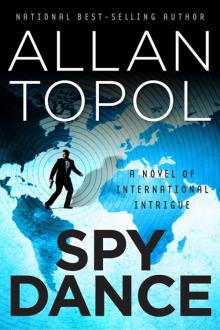 Spy Dance
Spy Dance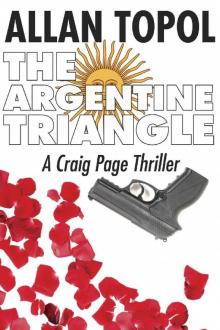 The Argentine Triangle: A Craig Page Thriller
The Argentine Triangle: A Craig Page Thriller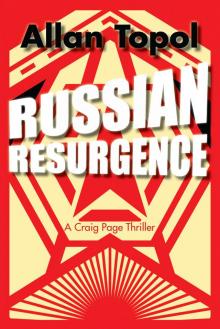 Russian Resurgence
Russian Resurgence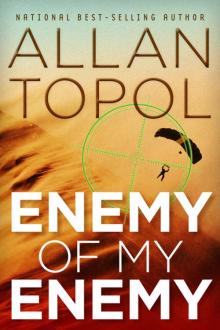 Enemy of My Enemy
Enemy of My Enemy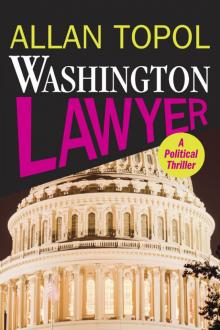 The Washington Lawyer
The Washington Lawyer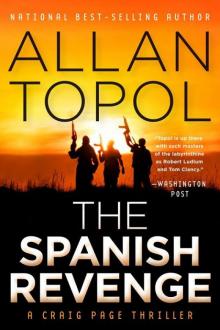 THE SPANISH REVENGE (Craig Page series)
THE SPANISH REVENGE (Craig Page series)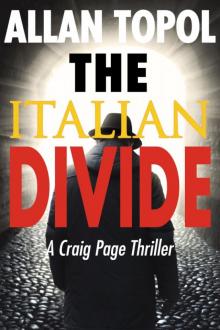 The Italian Divide
The Italian Divide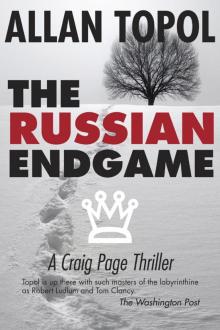 The Russian Endgame
The Russian Endgame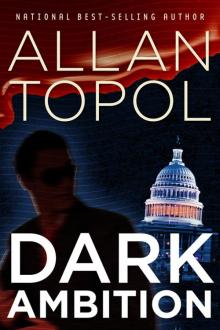 Dark Ambition
Dark Ambition